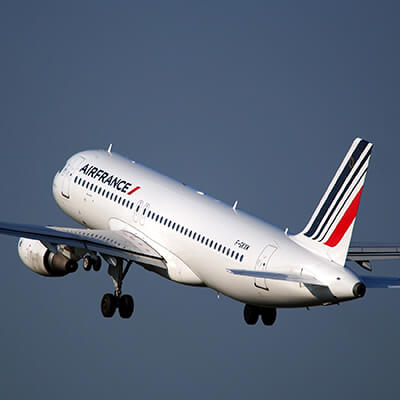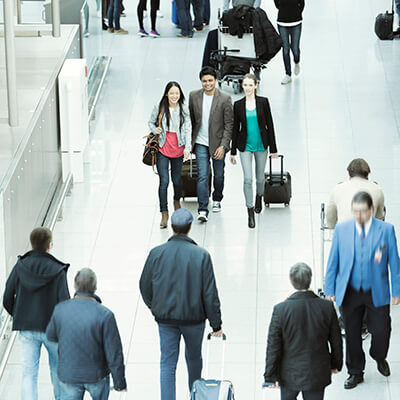IDEMIA supplies the world’s first biometric boarding pass
Challenged to meet new legal and security requirements at one of the busiest airports in the world, Air France turned to IDEMIA for an innovative solution aiming at decreasing costs and boarding times. The result is a first of its kind in the world of air transport, and it is already a huge success at Paris Charles de Gaulle Airport.
Paris Charles de Gaulle Airport is not only the busiest airport in France – it is also the second busiest in Europe and the tenth busiest in the world. So when a new law required travel document checks at both bag drop and boarding, moving passengers swiftly and smoothly from the sidewalk outside to their seats on the plane became an even greater challenge. Everyone’s patience was tested as long lines formed, boarding times increased, and costs went up.
A world first
 As one of the world’s most popular travel destination and with ever-increasing tourist numbers, it was immediately clear that a new solution was needed. Air France quickly launched an initiative with a clear objective: to facilitate and speed up the boarding process. The French flag carrier turned to IDEMIA, a world leader in biometric technology, identity management and security systems, for help. The result: a next-generation boarding pass with integrated passenger biometric data – a world first and a major innovation for the airline industry. This first-ever Biometric Boarding Pass eliminates the need to repeat manual ID checks at the gate as part of the boarding process. Instead, the passenger’s identity is verified using the biometric facial data captured at check-in or bag drop and stored in the boarding pass barcode. The solution simplifies and speeds up the entire process while fully complying with the new security requirements. Passengers, airline and airport all benefit now from shorter queues and less waiting time. The Biometric Boarding Pass went live at Paris Charles de Gaulle’s Terminal E for a test in June 2018. Three months later, Air France received an award at the Future Travel Experience (FTE) Global Awards in Las Vegas for the “Best On the Ground Initiative”.
As one of the world’s most popular travel destination and with ever-increasing tourist numbers, it was immediately clear that a new solution was needed. Air France quickly launched an initiative with a clear objective: to facilitate and speed up the boarding process. The French flag carrier turned to IDEMIA, a world leader in biometric technology, identity management and security systems, for help. The result: a next-generation boarding pass with integrated passenger biometric data – a world first and a major innovation for the airline industry. This first-ever Biometric Boarding Pass eliminates the need to repeat manual ID checks at the gate as part of the boarding process. Instead, the passenger’s identity is verified using the biometric facial data captured at check-in or bag drop and stored in the boarding pass barcode. The solution simplifies and speeds up the entire process while fully complying with the new security requirements. Passengers, airline and airport all benefit now from shorter queues and less waiting time. The Biometric Boarding Pass went live at Paris Charles de Gaulle’s Terminal E for a test in June 2018. Three months later, Air France received an award at the Future Travel Experience (FTE) Global Awards in Las Vegas for the “Best On the Ground Initiative”.
Across the world, ID checks lengthen the boarding process, creating unnecessary queues at boarding gates and increasing the overall travel time. Thanks to our biometric boarding pass, travelers can now enjoy a smoother and overall stress-free airport experience, while being in full control of their biometrics at every step of their journey. More importantly, our solution honors our tradition of taking a simple, secure and cost-effective approach, without ever jeopardizing security.
A shorter, smarter journey
 Tapping into our expertise in biometric technology and more than 18 years of on-the-ground experience at airports, we set out to deliver a simple, secure and cost-effective solution. How can we fix bottlenecks while remaining compliant and avoiding additional complexity? The answer was to use smart technology. Working closely with Air France, we developed a Biometric Boarding Pass that integrates our latest facial biometric technology but doesn’t require a central passenger database. The pilot was divided into two phases. The first phase targeted passengers of a specific destination. The second phase of the project, which was launched at the beginning of 2019, consisted of:
Tapping into our expertise in biometric technology and more than 18 years of on-the-ground experience at airports, we set out to deliver a simple, secure and cost-effective solution. How can we fix bottlenecks while remaining compliant and avoiding additional complexity? The answer was to use smart technology. Working closely with Air France, we developed a Biometric Boarding Pass that integrates our latest facial biometric technology but doesn’t require a central passenger database. The pilot was divided into two phases. The first phase targeted passengers of a specific destination. The second phase of the project, which was launched at the beginning of 2019, consisted of:
- integrating a digital identity check into the Air France check-in mobile app
- deploying innovations designed by the in-house IDEMIA research team ( UX, on-the-move recognition, liveness, 1/N newest algorithms)
Unlike other facial recognition solutions that need a database of faces to compare and match live images, the Biometric Boarding Pass encrypts a passenger’s face within the boarding pass barcode, while respecting IATA barcode standards (PDF 417). The biometric facial data is only stored in the boarding pass, meaning each passenger is in possession of their personal data at all times – a smart process that addresses the complexity of data privacy protection.
The Biometric Boarding Pass links two key steps in the passenger’s journey, making it shorter and smarter:
Check-in:
The passenger’s facial image is retrieved from the travel document scanned during the identity verification process at any checkin point (desk, kiosk, bag drop or mobile app). The facial biometric data is encrypted and encoded in the boarding pass barcode. As the process is automatic and doesn’t require any additional input, passengers experience the same quick and convenient check-in they are accustomed to.
Bag drop and boarding:
Using MFACE, our most advanced facial biometric technology, a live image of the passenger is captured during bag drop and boarding and is compared with the data on the boarding pass. This automatic and highly accurate identity verification process is considerably faster than the manual ID checks by airline personnel.
 In partnership with the airport authority, MFACE is integrated into the self-service check-in kiosks and bag drops in order to capture the passengers’ facial image and verify their identity (on-the-spot comparison of ID image with live face capture) at these checkpoints as well. After facial capture at the first point of contact and once through the airport security checkpoint, passengers can safely pocket their passports or ID cards until they land at their destination.
In partnership with the airport authority, MFACE is integrated into the self-service check-in kiosks and bag drops in order to capture the passengers’ facial image and verify their identity (on-the-spot comparison of ID image with live face capture) at these checkpoints as well. After facial capture at the first point of contact and once through the airport security checkpoint, passengers can safely pocket their passports or ID cards until they land at their destination.
The Biometric Boarding Pass is fully compliant with the EU’s General Data Protection Regulation (GDPR), meeting all personal data protection laws, regulatory requirements and principles of confidentiality. Because the passenger’s biometric data is encrypted and stored only in the boarding pass, it is not saved (temporarily or otherwise) in a central database and no data is unintentionally left behind (data shadows). With their boarding pass in hand, the passenger is in full control of their data at all times. Furthermore, if the boarding pass is lost or misplaced, the encrypted biometric data stored in the pass can only be decrypted at the correct boarding gate.
To test operational reliability, a prolonged series of trials were carried out, the first of which involved Air France flights to Cape Town, South Africa from Paris Charles de Gaulle Terminal E. The success of these tests led to the Biometric Boarding Pass solution being rolled out at gate L32.
A host of advantages
The Biometric Boarding Pass solution reduces boarding time while complying with security requirements, enhancing identity verification accuracy, and increasing airport, airline and national security:
- Smart and fast
State-of-the-art walk-through biometric technology facilitates passenger throughput and protects privacy while shortening travel time and providing a more pleasant travel experience. - Accurate and secure
Automated passenger identity verification at checkin, bag drop and boarding increases accuracy and security. - Efficient and economical
Automated processes and shorter lines reduce resource requirements, allowing staff to focus on passenger needs rather than checking IDs. - Quick and easy integration
Standardized solution makes it easy to interface with and integrate into existing airport and airline systems.
A win-win solution
AIRLINE & AIRPORT:
- One ID check
- Automated, accurate, fast controls
- Fewer resources, more productivity, reduced costs
- More compact infrastructure
- Quick and easy integration and expansion
PASSENGERS:
- One ID check
- Simple, secure and convenient process
- Shorter queues, less waiting time
- Walk-through, non-intrusive experience
- Personal data protection



